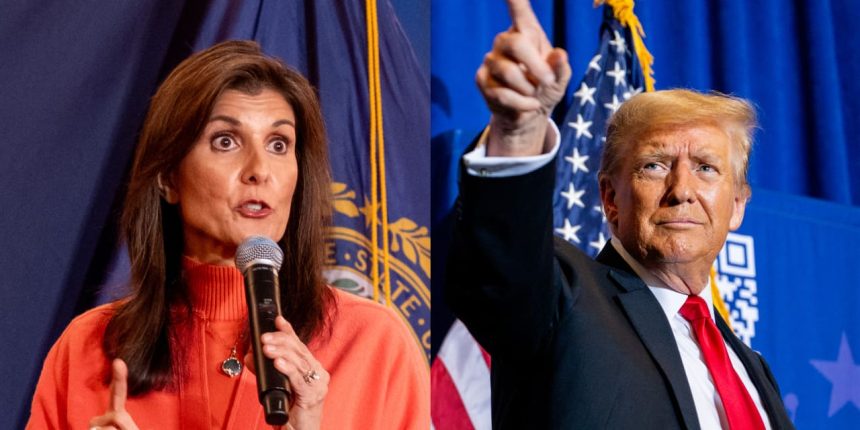It’s New Hampshire’s turn to make waves, as the state’s voters are casting ballots Tuesday in their closely watched Republican presidential primary election.
For Haley, a “win in New Hampshire is unlikely to reset the race,” Stifel’s chief Washington-policy strategist, Brian Gardner said in a recent note.
That’s because, Gardner wrote, exit polls for Iowa’s Republican caucuses suggested Haley “performed best with less conservative, suburban, and college-educated voters,” and there are “not enough Republican voters who fit this description in states other than New Hampshire for her to make a serious run at the nomination.”
New Hampshire, which allows independents to vote in its “open” primary, is expected to deliver a much closer contest than Iowa did. One American Research Group poll focused on the Granite State even showed Haley tied with Trump at 40% support. Former New Jersey Gov. Chris Christie’s Jan. 10 exit from the GOP presidential primary is seen as a help to Haley, as he has been a vocal Trump critic, so most of his supporters are likely switching to her rather than the former president.
On the other hand, Florida Gov. Ron DeSantis has dropped out as well, and a CNN/University of New Hampshire poll found 62% of his supporters in the state said Trump was their second choice, with just 30% of them picking Haley as their backup. DeSantis endorsed Trump on Sunday as he bowed out, while Christie hasn’t made an endorsement.
In RCP’s average of New Hampshire polls as of Tuesday, Trump got 56% support, followed by Haley at 37% and DeSantis at 8%.
Related: DeSantis ends presidential campaign Sunday with misquote of Winston Churchill
Some strategists have been upbeat about Haley’s overall prospects as the New Hampshire primary nears.
The roughly 50% support for Trump in Iowa, along with his under-50% support in New Hampshire polls through mid-January, has shown “Republican resistance to Trump, not a coronation of Trump or consolidation around Trump,” Terry Haines, founder of Pangaea Policy, said in a recent note. He wrote that his views are “non-consensus,” but emphasized that New Hampshire functions as “more of a hinge than Iowa” in the race to become the GOP challenger to President Joe Biden.
The state has a better track record of backing the eventual Republican nominee than Iowa, noted Isaac Boltansky, BTIG’s director of policy research. “Looking at the past 7 contests without a GOP incumbent in the
White House, New Hampshire has supported 5 of the eventual GOP nominees compared to Iowa only supporting two of the eventual nominees,” he said in a recent note.
The two times that New Hampshire didn’t back the eventual Republican nominee were in 2000, when the state’s voters favored John McCain over George W. Bush, and in 1996, when they went with Pat Buchanan rather than Bob Dole. That’s shown in the chart below.
If Trump follows up his Iowa win with a victory in New Hampshire, he would become the first non-incumbent Republican presidential candidate to triumph in both states. Iowa’s caucuses became a political bellwether during the 1970s, while New Hampshire’s primary rose to prominence decades earlier.
BTIG’s Boltansky said his team continues to believe that Trump will be the GOP nominee for president, and that the nomination battle will be over shortly after the Super Tuesday primaries on March 5, when more than a dozen states are scheduled to vote.
Stifel’s Gardner has sounded dismissive about Haley’s chances in the Feb. 24 primary in her home state of South Carolina, saying she has not been on a ballot there in a decade and Trump has a 30-point lead in polls for that contest, according to a RCP’s average. She was South Carolina’s governor for six years, then resigned in January 2017 to serve as Trump’s ambassador to the United Nations.
Others are also pointing to Trump’s big lead in non-New Hampshire polls:
South Carolina’s junior U.S. senator, former GOP presidential hopeful Tim Scott, added to Haley’s problems in their state on Friday, as Scott announced he’s endorsing Trump.
There wasn’t a debate in New Hampshire between those candidates still running in the Republican primary, as only DeSantis had agreed to take part before leaving the race. Trump has skipped all of the primary’s debates, while Haley’s refusal this time is a new approach, as she has participated in the previous clashes. She had said she’d only debate if Trump were on stage, as she focused more on the former president rather than DeSantis.
On Jan. 15, Trump won the Iowa caucuses with 51% support, well ahead of second-place finisher DeSantis, who got 21%. Haley finished third in Iowa with 19% support.
Convention might deliver shake-up
The GOP’s convention in July could offer much more of an opportunity to a non-Trump presidential hopeful than any voting in early states, according to Henrietta Treyz, director of policy research at Veda Partners.
“In our view, the only and best chance for Republicans to emerge with a candidate not named Trump will come during the Republican National Convention in Milwaukee,” she said in a recent note.
The 91 criminal charges that Trump is facing, along with the “potential for unforeseen general election-phase developments,” means that it “makes some sense for the party to have a runner-up in the wings just in case,” Treyz added.
Trump faces charges in Washington, D.C., and Georgia’s Fulton County in election-interference cases and also was indicted last year in a hush-money case and a classified-documents case. He has denied wrongdoing and argued the prosecutions are politically motivated, and many Republican voters share his views and have rallied around him.
Read the full article here




